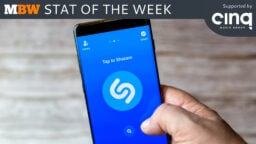MBW’s Stat Of The Week is a series in which we highlight a single data point that deserves the attention of the global music industry. Stat Of the Week is supported by Cinq Music Group, a technology-driven record label, distribution, and rights management company.
Back in March, MBW spotted and reported a fairly stunning stat within Universal Music Group‘s annual financial results for 2020.
It showed that the company spent over $1.71 billion (€1.52 billion) last year on a combination of catalog acquisitions and “advances to artists net of recoupment”.
This figure equated to a spend of over $4.5 million every day, and was more than three times larger than the equivalent figure from 2019.
Now, though, we have an official number for the total amount Universal spent in this realm (catalog acquisitions plus artist advances) in 2020 – not net of the money it recouped back in royalties during the year from its artist-advance deals.
According to Vivendi’s annual financial report, UMG spent some €2.54 billion ($2.87 billion) on catalog acquisitions and artist advances last year.
That figure was up 71% on the €1.48 billion UMG spent on the category in 2019.
UMG then recouped €1.02 billion from those advances within the 2020 calendar year, resulting in that €1.52 billion ($1.71 billion) net expenditure (see below, in Euros, with 2020 in the left column and 2019 in the right column).
The $2.87 billion UMG spent on catalog acquisitions and artist advances last year works out at the equivalent of spending $7.8 million every day.

All of this would be interesting in any given year, but the fact 2020 was the year before Universal Music Group lists on the Amsterdam stock exchange makes for extra interesting reading.
That’s because of the theory that UMG used 2020 to ‘lock down’ superstar artists to new long-term deals to boost investor prospects in the years ahead, as well as taking long-term ownership of catalogs near-guaranteed to provide a healthy annual income stream.
That was certainly the case with Bob Dylan’s song catalog, which UMG acquired for over $300 million late last year. (This $300m-plus is covered within Universal’s $2.87 billion spend on catalog buys and artist advances in 2020.)
Vivendi has already hinted that Universal’s expenditure on acquisitions in 2021 will likely be at a more modest level.
In a May press release, Vivendi announced that Universal’s EBIT profitability grew 35.8% YoY in the first quarter of 2021, partly as a result of “strict cost control” at the major music company in the period.
There was a different story playing out during this quarter over at UMG rival, Sony Music Group.
In Q1 this year alone, Sony agreed to spend somewhere around a billion dollars on three deals: The $430 million buyout of AWAL and Kobalt Neighbouring Rights from Kobalt Music Group; the nine-figure acquisition of Paul Simon’s song catalog; and the $255 million acquisition of Brazilian label Som Livre.
Since then, Sony Music has also announced the nine-figure acquisition of a majority stake in Todd Moscowitz’s Alamo Records.
Industry sources suggest that deal saw Universal – who owned a 50% stake in Alamo before the sale – bank a $125 million payday for its equity.
Meanwhile, a US-based SPAC run by noted billionaire Bill Ackman acquired a 10% stake in Universal Music Group last month in a $4 billion deal.
Pershing Square Tontine Holdings (PSTH) subsequently told its investors that UMG would offer them “predictable, recurring revenue streams that require minimal capital despite high growth”, as well as “significant fixed‐cost expense base allowing for long‐term margin expansion.”





